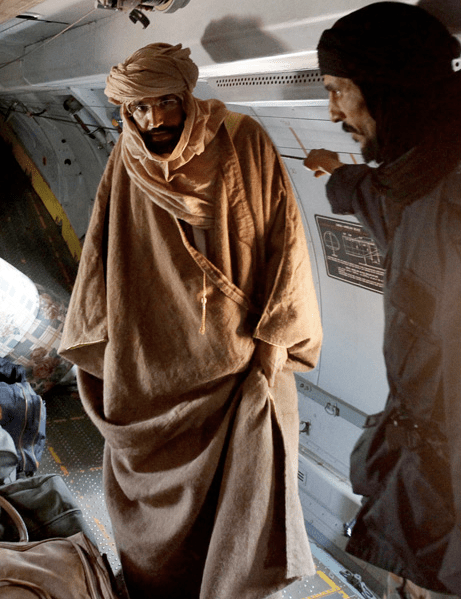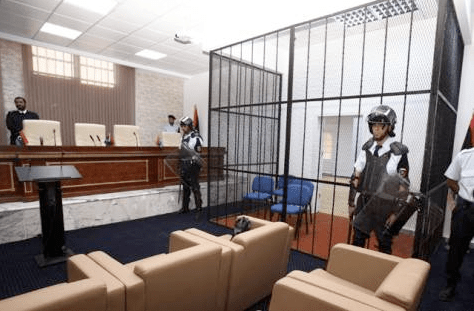Most readers will know by now that the Pre-Trial Chamber of the International Court dismissed Libya’s ruling National Transition Council (NTC)’s application to try Saif al-Islam Gaddafi in Libya. Saif, of course, was indicted by the ICC in June 2011 for his role in crushing the Libyan uprising in February 2011 and has been in detention since mid-November 2011. In this and the next post, I will offer some thoughts on the ruling, and the reactions and controversies it has stirred. This piece focuses on the curious and tumultuous situation on the ground in Libya.
Since being arrested by a group of Zintan rebels, Saif Gaddafi, the formerly gallivanting, ‘playboy’ son of late Libyan leader Muammar Gaddafi, has been held at a secret location in the city of Zintan, home to an impressive Libyan rebel militia which also has Tripoli airport in its prized possession. The circumstances of Saif’s detention is a point that often gets lost in analyses of justice in Libya but is worth stressing: to date, Saif has not been in the hands of the Libyan government. This fact has shaped post-conflict Libya as Saif’s fate has become quite the political asset. Notably Osama al-Juwali, a leader of the Zintani rebels, netted the position of interim defense minister in the NTC.
More troubling, however, has been Saif’s treatment in detention. Saif has become an unlikely cause of human rights groups which have criticized the fact that Saif has been held without legal representation since being arrested, was not informed of the charges against him, has been denied access to lawyers on a number of occasions, and has suffered without proper medical and dental care. More recently, in a letter containing stunning revelations, Xavier-Jean Keïta, principal counsel at the ICC’s Office of Public Counsel for the Defense at the ICC, suggested that Saif had been “physically attacked” while in custody.
Meanwhile, the NTC has been adamant that Saif has been treated fairly and will get a fair trial in Tripoli. To prove it, they’ve built an enormous prison featuring a basketball court, personal chef and satellite TV. One prison guard maintains that “[t]here is not one thing Saif will not have here. This prison is like a castle, a castle fit for a king.” Certainly, for those critics of the ICC who argue that imprisonment in The Hague offers too “cozy” a punishment, the lavish and luxurious nature of Saif’s personal prison palace is food for thought. It is further troubling that the governing authorities are willing to build such an enormous facility for one person, however prized, while thousands of other former combatants remain crammed in make-shift prisons.
But the oddest and most stunning news pertained to Keïta’s description of the charges the NTC originally wanted to levy against Saif:
“Mr. Gaddafi was advised that he was being investigated for trivial allegations concerning the absence of a license for camels, and irregularities concerning fish farms, and that he would not be pursued for serious crimes, such as murder and rape, due to lack of evidence.”
Keïta added that when the ICC began to put pressure on the NTC to adhere to its international legal obligations, Libyan authorities did an about-face and charged him with more serious crimes, similar to those for which the ICC issued an arrest warrant. But, seriously, camel licences? Irregularities concerning fish farms? There is no way to independently verify Keïta’s claims, but if he is right, it poses serious questions about justice in post-conflict Libya. However, to me at least, it just doesn’t seem to add up. A trial on the basis of camel licenses and fish farm irregularities would have been an injustice and a farce. If Saif were to be convicted of these offenses, he would likely receive a minimal sentence or perhaps even just a fine. And this for someone at the very heart of the regime’s crackdown on civilians last year. It certainly isn’t hard to imagine that it would have instigated a violent backlash against the fragile NTC. For these reasons, without any substantive evidence to back-up Keïta’s claim, it’s difficult not to doubt its truthfulness.
Of course, the NTC has stated in no uncertain terms that Saif isn’t going anywhere. In reaction to the ICC’s ruling that the country must surrender Saif immediately, Libya’s Interim Justice Minister, Ali Ashour, declared that “there is no intention to hand him [Saif al-Islam] over to the ICC, and Libyan law is the right system to be used to try Saif Gaddafi”. Ahmed Jehani, Libya’s representative to the Court went a step further, exclaiming that “[n]o amount of pressure will push Libya to hand [Saif Gaddafi] over.”
It is worth noting that with regards to where Saif would be tried, there has been debate but never any confusion. The NTC has been unwavering in its quest to try Saif in Libya, by Libyans, regardless of what the ICC ruled. The international community has, by and large, supported Libya in doing so. In this context, the mere fact that Libya is engaging the ICC on these matters is important. Libyan authorities are clearly not cooperating with the Court to the extent the ICC would like and appear to be playing a game of fast-and-loose. But the NTC clearly feels that, at least to some extent, engaging with international institutions, including the Court, is linked to its political transition and international standing. The NTC clearly prefers the seal of approval from the ICC’s Pre-Trial Chamber, rather than having allegations of injustice weigh on its international reputation.
Continuing the cat-and-mouse game that has become the relationship between the Court and Libyan authorities, the NTC has submitted an appeal to the ICC, arguing that the Pre-Trial Chamber made a legal error in ruling that Libya had to hand over Saif immediately. However, while the NTC wants more time to put together a case to challenge the admissibility of the ICC’s charges against Saif, it has gone to great lengths to set up his trial, hoping to have it completed before national elections in June 2012. In addition to Saif’s personal prison, Libyan authorities have unveiled the courtroom where Colonel Gaddafi’s son will face charges of rape, murder and corruption. Additionally, according to Chris Stephen, Libya’s interim leader, Mustafa Abdul Jalil, has said that a trial could start as earlier as April 13, 2011. If true, it would seem the NTC is trying to ‘run out the clock’ on Saif and hastily ‘get justice over with’. This, again, was a point picked up by Keïta:
“It is clear that the ICC will not be in a position to render its decision on the admissibility of the case until after Mr Gaddafi has been tried, and potentially sentenced and executed. The postponement of Mr Gaddafi’s surrender could therefore be at the cost of his life.”
Libyan authorities continue to express confidence that the country’s judiciary will be able to fairly and credibly try Saif. Interim Prime Minister Abdurrahim El-Keib has declared that “[w]e will respect the international law but we do have a lot of respect for our Libyan law and I guarantee you there will be no problem.” But legitimate concerns remain. There are few who seriously doubt that Saif won’t be sentenced to death and executed. Further, if authorities were unable to keep Saif safe from physical attacks while in secret detention, it remains unclear how they will be able to hold a public trial in Tripoli without any instigation of violence.
It remains difficult to separate fact from fiction in the murky tumult that is post-Gaddafi Libya. One thing, however, remains clear: the pursuit of justice continues to shape the political future of the country.





Reblogged this on Patricia Alejandro.
Oh!
Amazing this artile… specialy ” And this for someone at the very heart of the regime’s crackdown on civilians ( Check video until de end http://f-se.blogspot.pt/2011/11/f-se-nato-in-name-of-humanity-my-name.html ) last year. It certainly isn’t hard to imagine that it would have instigated a violent backlash against the fragile NTC. ” Fragile NTC … are U ignoring that many ppl know that Media hid how Brutal & criminals are this NTC? Are Ignoring that many ppl in this world Knows that Media and some Parrots of empty words are collaborating with this brutal Crimnals NTC? Are Ignoring that WHO DON’T PUNISH CRUELTY collaborate with it!
Are U Ignoring that U are washing this abnormal criminal?
The Death of saif al Islam Will be the crime against Humanity! Saif Gaddafi – A Case Study of Human Perversity Against a Bigger Man. Saif symbolize all Libyan Innocent PPL Killed By a ROTTEN POLITICAL UPPER CLASS and their Media Ghostkillers.
Shame on You! U and others like U should be investigated and charged with Crimes against Humanity! NOT Saif.
Pingback: Distinctly Arab? Questions about Transitional Justice and the Arab Spring (Part II) « International Law & Justice Log